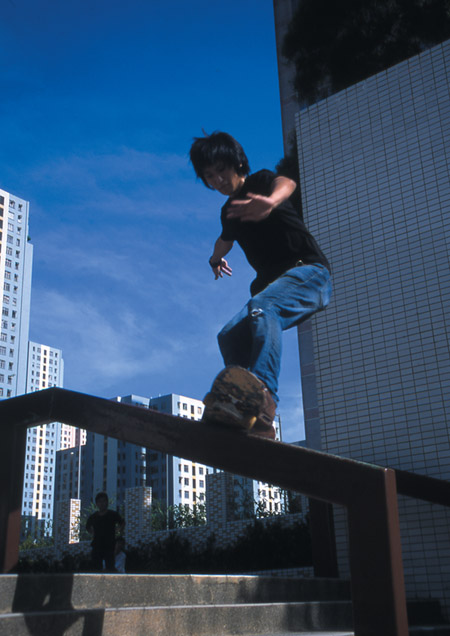Skatebroading
Broaders on border of acceptance in Hong Kong
Photos & text by Barry Wu, Karen Tong, Gladys Leung & Candy Tong

Skateboarding
has a long and colorful history that can be
traced back some 40 years. When skateboarding first
emerged in California in the Sixties, it borrowed its form
from surfing, which was then a popular sport.
The first skateboards were simply wooden boards with metal or clay wheels attached to the undersides.
It started to be seen as a sport in the early 1980s. Before then, there were no professional skateboarders and skateboards were just toys for kids.
According to Warren Stuart, 34, a veteran skateboarder of 17 years, the change was initiated by a few American youngsters when they started to build skate parks.
Said Mr. Stuart: “Some Hong Kong teenagers followed this trend. They formed informal local skateboarder groups in the late 1980s.”
These skaters did not stay at a fixed venue. “We often started skateboarding at the Southorn Playground and then headed east to Causeway Bay,” said Mr. Warren. “Sometimes we went to Tsim Sha Tsui to meet the Kowloon group.”
The number of skateboarders kept rising. However, since 1999, fewer people have been riding skateboards. “Many beginners gave up quickly because they did not really like this sport. They just wanted to follow the fashion,” said Mr. Stuart.
Despite the fading trend, skateboarding enthusiasts stick to learning it. Skateboarding classes are held in parks in various different districts.
X-Skate Hong Kong for example, is an association that provides regular skateboarding courses. Marc Chan, coach and team leader of the group, advises enthusiasts to learn the sport by taking regular courses, although he learned the sport by himself.
“It’s less efficient for skateboarders to learn the skills on their own,” said Mr. Chan. “Moreover, it’s very easy for them to injure themselves. Learning in classes can reduce the chances of injury.”
Mr. Chan teaches three skateboarding classes every week, with about 10 students in each class. Each lesson costs $100, which is quite expensive to some skateboarders. Therefore some prefer to practise the sport on their own, which can prove to be quite difficult at times.
According to Hang Lai, a 19-year-old skateboarder, skate-boarding is not widely accepted in Hong Kong.
“I often skate with my friends at night. The police sometimes shoo us away or ask for our identity cards, just because we are suspected to be bad kids,” he said.
The limited number of skateboarding venues is a big problem too.
“The government does not provide skateboard zones for us, so we just wander around the streets, looking for stairs and handrails,” he said.



